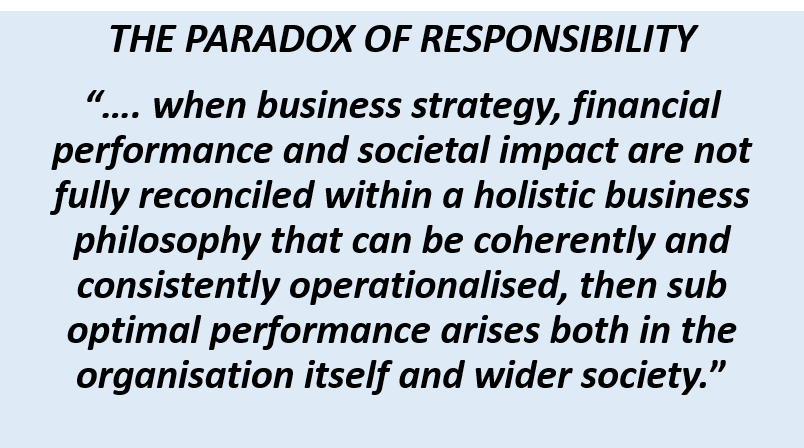 There is more confusion in the world of investment today than there has ever been. Historically, the most contentious debate has been around differing perspectives on value (short or long term, shareholder or other stakeholders?). More recently, further confusion has emanated from a well-meaning but misguided focus on what constitutes good corporate governance and responsible behaviour; especially with respect to social and environmental issues. In the investment world, responsible investing has tended to be brought under the umbrella of ‘ESG’ (environmental, social, governance), an amalgamation of so called ‘non-financial’ factors that have become increasingly viewed as critical to the long term value of an organisation. Alongside this has been the emergence of ‘social impact’ – investing in altruistic endeavours that also provide a return (e.g. affordable housing) – an area that has often presented the most conflicted and contradictory thinking. Ironically, the primary causes of the confusion can be laid at the doors of the main protagonists. So who are they?
There is more confusion in the world of investment today than there has ever been. Historically, the most contentious debate has been around differing perspectives on value (short or long term, shareholder or other stakeholders?). More recently, further confusion has emanated from a well-meaning but misguided focus on what constitutes good corporate governance and responsible behaviour; especially with respect to social and environmental issues. In the investment world, responsible investing has tended to be brought under the umbrella of ‘ESG’ (environmental, social, governance), an amalgamation of so called ‘non-financial’ factors that have become increasingly viewed as critical to the long term value of an organisation. Alongside this has been the emergence of ‘social impact’ – investing in altruistic endeavours that also provide a return (e.g. affordable housing) – an area that has often presented the most conflicted and contradictory thinking. Ironically, the primary causes of the confusion can be laid at the doors of the main protagonists. So who are they?

The UN is a major contributor here. With its 6 Principles of Responsible Investment (PRI) and its focus on Sustainable Development Goals (SDGs) the UN has identified important objectives. However, the usefulness of the SDGs has been questioned by investors and corporations as they cannot be easily reconciled with their own, market driven, business and operating models. A cursory review shows that they were never designed this way. Establishing these ‘principles’ and ‘goals’ will not make them part of the whole global system unless they are seen to be mutually inclusive aims with long term, business strategies. The UN has yet to develop the necessary system for this to happen in practice. In short, there is little coherent evidence of a relationship between the SDG’s and corporate performance.
First, it is unclear how a company should reconcile the SDGs to its business plans e.g. how does SDG No. 8, to “Promote sustained, inclusive and sustainable economic growth, full and productive employment and decent work for all” translate across all business operations? Who determines success and, if the SDG is reached, is there any further room for improvement? How does a CFO, who has to make the finances work, consider “decent work” and translate SDG alignment into corporate value outcomes? Have they ever been trained in this new endeavour? Traditionally, accountants have been trained to treat workers as a cost rather than as valuable human capital, while the accounting profession has yet to develop a methodology to report on human capital in a way that is meaningful to investors.
Another group of protagonists can be found within the ‘ESG’ sector of the investment community. ESG analysts often use lists of indicators (e.g. gender diversity), and third party corporate rankings, that claim to provide insight into corporate capability for generating value and managing risk. Similar to the UN, such indicators and rankings may be considered alongside conventional financial analysis. In practice, this becomes challenging.
For example, such indicators ignore basic questions, such as which element of ‘ESG’ is most important to value (environmental, social, or governance?). Or, what indicators are most material to assess risk? ESG in practice tends to be a compilation of seemingly important data points rather than a coherent model linking corporate activity to value creation. In the words of Vincent Papa, the director of financial reporting policy at the CFA Institute (October 2017): “Our members and investors rely on various sources of information, including what companies disclose. But …there’s a gap between the quality of information that’s provided by companies and the suitability of this information to what investors need. There’s an information gap.”
Rather late to this movement is the UK Government but Prime Minister Theresa May probably felt compelled to enter the fray when she recently commissioned an “industry taskforce on social impact investment” following the Government’s 2017 report entitled “Growing a culture of social impact investing in the UK”. The Report states that “social impact investing specifically targets companies and organisations that intentionally create a positive social benefit, either as a primary or secondary purpose.” Surely all companies and organizations are defined by their purpose and that purpose has to be a positive societal benefit? If they are not, shouldn’t governments be framing legislation accordingly? To a hungry customer McDonalds provides a positive social benefit. How is that any different to a water company providing water? Such false dichotomies and distinctions truly bedevil the whole debate about what constitutes societal responsibility.
This is why the Maturity Institute (MI) was founded in 2012; with a very clear definition of purpose and value that serves all societal stakeholders, in a coherent and mutually inclusive way. Yet the way we measure achievement against our goals of value maximisation incorporates conventional, financial metrics (e.g. price to book ratio) with organisational capability and a range of societal factors (e.g. learning and innovation systems, societal purpose, authenticity and trust). Our OM30 questions generate an organization’s OMINDEX rating along with a score for its Total Stakeholder Value (TSV).
The most mature organizations, reflected in their high TSV, generate the best investment returns and benefits to society. They are also most likely to be both responsible and sustainable. In this system, an organization’s financial goals do not conflict with their societal goals; they are mutually inclusive and mutually reinforcing with customers drawn to the superior value they offer. There are no longer false and misleading distinctions to be made between the ‘financial’ and the ‘non-financial’. There is no longer a false dichotomy between ‘commercial’ and ‘societal’. Healthcare services, for example, whether provided by the state or commercial enterprise, is measured on the TSV of the organization that provides it, irrespective of its legal entity.
We recently rated a selection of companies in the consumer goods sector and some of them are shown below, together with their TSV score (as at 14 March 2018):
| Company | OMR | Total Stakeholder Value | Mkt Cap | P/B Ratio | Op Margin |
| Unilever PLC | BB+ | 1.54 | UK£102bn | 3.28 | 15.56% |
| Danone | BBB- | 1.82 | EUR41.86bn | 3.38 | 14.36% |
| Reckitt Benckiser | A- | 1.97 | UK£40.26bn | 3.00 | 25.68% |
| Nestle | BB+ | 1.99 | CHF234.02bn | 3.72 | 16.26% |
When maturity analysis is applied to a large corporation such as Unilever, which has been a flag carrier for sustainability, the contradictions and inconsistencies of ‘social impact’ thinking on business strategy and performance are revealed. In essence, while Unilever’s ‘sustainable living’ strategy has been based on a very different vision to other large consumer goods companies, this vision has not translated effectively into a coherent, alternative business or operating plan that has convinced the markets and investors. Our examination* of Unilever’s performance and market valuation, both today and into the future, relative to its main competitors, was prompted by Unilever becoming vulnerable to a possible takeover by Kraft in 2017. This sent such a shock wave throughout the company that it caused it to revert to a shareholder value driven management approach, explicitly acknowledged by its CEO Paul Polman.
As a direct consequence, we downgraded Unilever’s previous OMINDEX rating from BBB- (2016) to BB+ to reflect its reversion to more conventional value management (cost cutting, share buy-backs and higher returns for shareholders) which our evidence shows has already been at the expense of long term company value. In the table above we make comparisons with several of its closest competitors. The most telling metric here is that, despite its high-profile commitment to the UN’s principles and sustainability goals, Unilever now performs worst on Total Stakeholder Value.
This is the paradox of ‘responsibility’; when business strategy, financial performance and societal impact are not fully reconciled within a holistic business philosophy that can be coherently and consistently operationalised, then sub optimal performance arises both in the organization itself and wider society.
Getting such a holistic approach right is the main theme of a very recent article in ‘Investment & Pensions Europe’, which highlighted “the need for a standardised and comparable analysis that considers a company’s social and environmental performance alongside its financial performance”. In the same piece Schroders, the asset manager, are quoted as having warned about the risk of investors being misled by inappropriate use of SDGs saying – “SDGs were not designed for investors, ….. We are concerned they are being misappropriated and misused …..Most of these measures are directed at systemic challenges that investors and companies have no direct mechanism to address”.
MI’s response is designed to address the systemic challenges head-on, with very practical measures and the means for implementation. The most mature companies on OMINDEX have already been creating high Total Stakeholder Value for many years. Our aim is to make such practices widespread across corporations and for them to be recognised and utilised within the mainstream investment community.
*Copies of our Unilever case study are available from stuart.woollard@omservices.org
Comments are closed